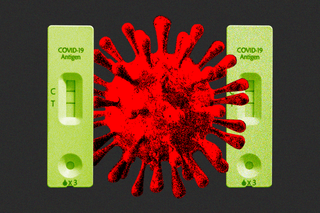
With Omicron, Can Home Testing Prevent Overburdening Healthcare Systems?
New research shows rapid antigen tests show more false negatives for the new variant, but there may still be some merit to taking them often.

If you remember diagnostic labs being overwhelmed during the second wave of Covid19 last year, you’d perhaps think rapid home testing would be a boon now with case numbers multiplying exponentially across the country over the past week — especially with reports suggesting that we may be on the brink of a third wave.
You wouldn’t be wrong in placing your faith on home tests, but there’s a catch — a very, very pertinent one. According to the U.S. Food and Drug Administration, rapid tests have a greater likelihood of yielding false negatives when it comes to the Omicron-variant of the novel coronavirus, compared to its past variants. This is due to the fact that antigen tests have exhibited reduced sensitivity to Omicron.
People are beginning to report similar experiences with antigen tests in India too. “I got a negative on my rapid antigen test on the same day my RT-PCR test result indicated I am Covid-positive,” A. from Pune told The Swaddle.
RT-PCR tests are considered the “gold standard” for detecting Covid19. However, results from RT-PCR tests often take longer to arrive than rapid antigen tests, or home tests, whose results can be accessed within 15 to 30 minutes. RT-PCR tests look for genetic material from the virus, whereas rapid antigen tests detect proteins from the virus which induce an immune response — making it easier for them to yield positive results when there is a greater viral load.
Given that the rapid tests are faster, easier, and cheaper, policymakers have been considering using them for mass screening in schools, universities, and workplaces — to identify and quarantine infected individuals, even before they start showing symptoms. Unfortunately, however, an asymptomatic individual may have a lower viral load, which could lead the rapid tests to yield a negative result.
Related on The Swaddle:
Scientists Find Why Some People Test Negative for Covid19 Despite Exposure
However, despite their reduced sensitivity to the new variant, there may still be some merit to taking home tests, experts note. “The fact that the sensitivity is diminished somewhat does not obviate the importance of the, still, advantage and usefulness of these tests under different circumstances.” Dr. Anthony Fauci, U.S. President Joe Biden’s chief medical adviser, clarified at a White House briefing.
Home testing does seem to have some advantages over RT-PCR tests — particularly due to their speed and accessibility. After speaking to Rachael Piltch-Loeb, a researcher at the Harvard T.H. Chan School of Public Health, National Geographic’s writer, Amy McKeever, wrote, “[G]iven how quickly Omicron can spread… the more reliable PCR tests don’t always make sense. While it typically takes two to three days to get the lab results back, the recent surge in testing has overwhelmed laboratories, meaning that it is taking even longer for results to be returned. So, if you don’t get your result back in time for a planned gathering… the PCR may not help make a time-sensitive decision.”
Moreover, due to their diminished sensitivity to Omicron, a positive antigen test also serves as a strong indicator of a greater viral load — which can, by extension, suggest one is more likely to spread it. “[A] positive rapid test may ultimately be a better indicator than a positive PCR test for whether you are shedding virus and pose a threat to grandma tonight,” McKeever added.
But the question remains: are rapid tests reliable enough for people to base such decisions on?
“Testing is the only way to really know what risk you pose to yourself and to your community… The part that I worry about is when you get a negative. What does the negative mean? What level of comfort does that give you?” Barun Mathema, an assistant professor of epidemiology at Columbia University Mailman School of Public Health, noted, expressing that antigen tests leave people “with some uncertainty as to what your status is.”
Related on The Swaddle:
An Eye Scan Could Determine if Patients Have ‘Long Covid,’ Research Shows
One solution to alleviate the uncertainty is to take the test, at least, twice, and at specific intervals, to “confirm” a negative result. “A negative self-test result means that the test did not detect the virus and you may not have an infection, but it does not rule out infection,” CDC noted, recommending that “repeating the test within a few days, with at least 24 hours between tests, will increase the confidence that you are not infected.”
To be completely safe and conscientious, Mathema, too, has a suggestion. He recommends following up negative results from rapid tests with an RT-PCR test before making one’s way into congregations and potentially exposing others — often one’s own friends and family members, in fact — to the virus.
Basically, “if you feel any symptoms but test negative, it’s not a get-out-of-jail-free card. You may need to test again and hold off a little bit on assuming that you’re negative.”
Amid the “do they”/”don’t they” debate on the usefulness of the tests, Mathema’s general advice for the population, however, echoes what healthcare experts have been saying for more than a year now: “If there’s any moment to get vaccinated, this is the moment… [O]ne thing this pathogen will do is it will find the unvaccinated.”
Devrupa Rakshit is an Associate Editor at The Swaddle. She is a lawyer by education, a poet by accident, a painter by shaukh, and autistic by birth. You can find her on Instagram @devruparakshit.
Related


Illinois School Students Can Now Avail 5 Mental Health Days Every Year
